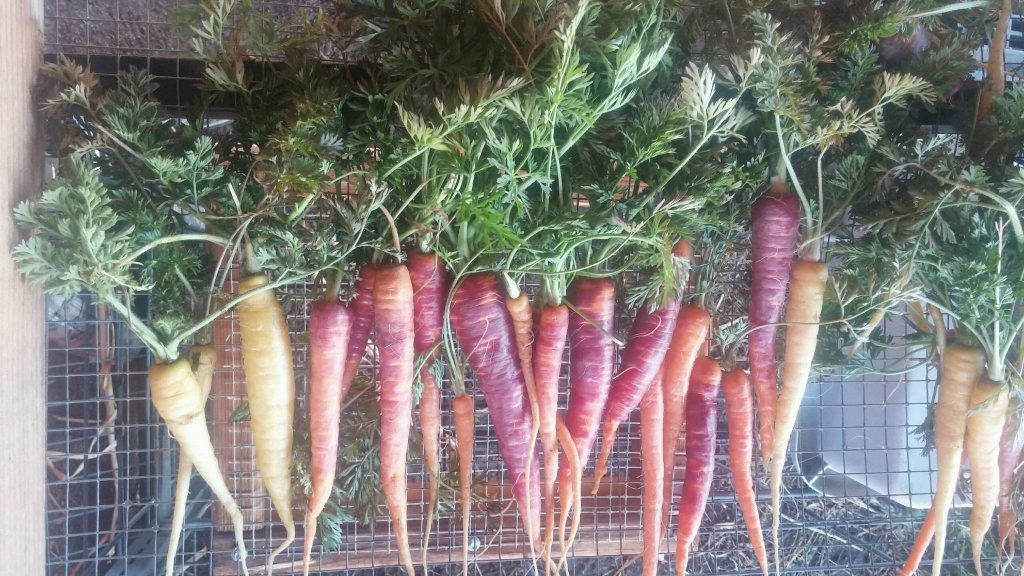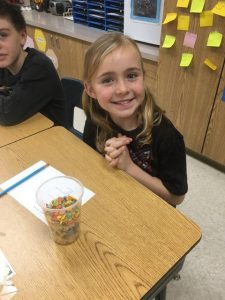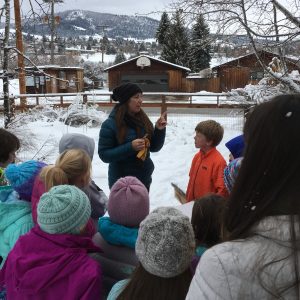By Victorian Tilley
As I enter through the doors of the elementary school here
in Butte, everything seems to have shrunk down in size. It has been quite a
while since I have walked into a school building that’s not on a college
campus. This month I had the opportunity to join FoodCorps Courtney Nucito in a
kindergarten class at an elementary school here in Butte. While you would think
that there’s no need to be nervous in front of little kids, I definitely was.
It didn’t take long for them to warm up to me though, and me to them, but when
you have a bunch of kindergartners staring at you and wanting to be
entertained, the pressure suddenly becomes more intense.
We visited a class of about 12 kids, who were quite excited when they saw Courtney
and me (mainly Courtney) because they knew they are about to do something fun
and out of their normal schedule. A small lesson had been prepared that focused
on carrots and how they grow. We were also going to be planting “fairy
carrots,” which are carrots planted in a mason jar. My role that day was to
simply assist in the classroom management side but I was also gaining some
familiarity with these kinds of educational moments as well as getting to know
the kids. They weren’t very sure why there was a new, random woman sitting next
to their regular FoodCorps teacher, but after a little interaction they were
back to normal and even wanting to sit next to me and chat.
The kids were adorable and as I mentioned, very excited to be having their
food/plant lesson with us. It was really great to see Courtney and their regular
teacher use certain techniques to get them to pay attention and listen, like,
“find your pockets!” which was just a way to get them to stay seated on their
carpet. We read to them a story about planting gardens in abandoned spaces, and
another story on how carrots grow. It’s something I forgot about, but it is
pretty amazing how story telling reels 5-year olds in. After story time, we
passed the jar around the circle of kids and let them make a wish. When someone
was holding the jar, they made a wish for something to happen in the jar. So
magical! There was something really spiritual about it, letting the kids put
their good thoughts and wishes into the jar before planting the carrot seeds.
After we prayed over the jar, we passed around carrot seeds for the kids to
look at. So tiny! Lastly, we placed the seeds into the soil in the jar, let a
student water them in, and then we played the Seed Game. This is when the kids
got to act like seeds and as the teacher walked around and gave the
“seeds” water, sunlight and air, they grew very tall. As I hung
out with the kids, played games and planted tiny seeds with them, I myself felt
like a kid again. Just to be immersed in the simple yet sweet act of planting
seeds and learning how they grow is a great lesson for any age. I believe that recognizing
the simple things in life now and again is important for making room for the
stuff that matters.
Experiences like this are really beneficial because there is a direct effort of getting to one root of a big issue. The issue that encompasses the health of our people and our future generations, protecting our environment, regaining our relationship with land and nature, and reclaiming ancient knowledge of taking care of our planet is especially important to get across to young people. I am confident that many of you reading understand that engaging younger children in any effort to enhance the well-being of our planet and our people is a major conduit for change. They soak up so much information and are very enthusiastic about it. Here at the SIFT Farm, we have made a slight production shift to focus more on community outreach through donations rather than market sales. A major part of this new focus is enhancing the YMCA’s garden program. During the summer we will have elementary and middle school-age kids come out for all kinds of gardening activities and learning opportunities. We will be able to plant seeds, tend the soil, weed, water, harvest crops together among many other activities. Hopefully the kids will be (or become) excited to observe nature, learn about agriculture, learn about community, their role that they play in both, and if nothing else, they’re just excited to be outside! Overall, we are excited about shifting our focus more on outreach and honing in on what would really make the Butte community a resilient one. I had the pleasure of discussing this transition with John Wallace, Farm Manager on a podcast that you can check out here.
Being a part of this educational lesson with Courtney and the class was a real treat. Starting young with food and gardening learning experiences is something I believe to be very important for a child’s mental, physical, and social development. I’m looking forward to hanging out with the kids and to channeling my inner child again.








